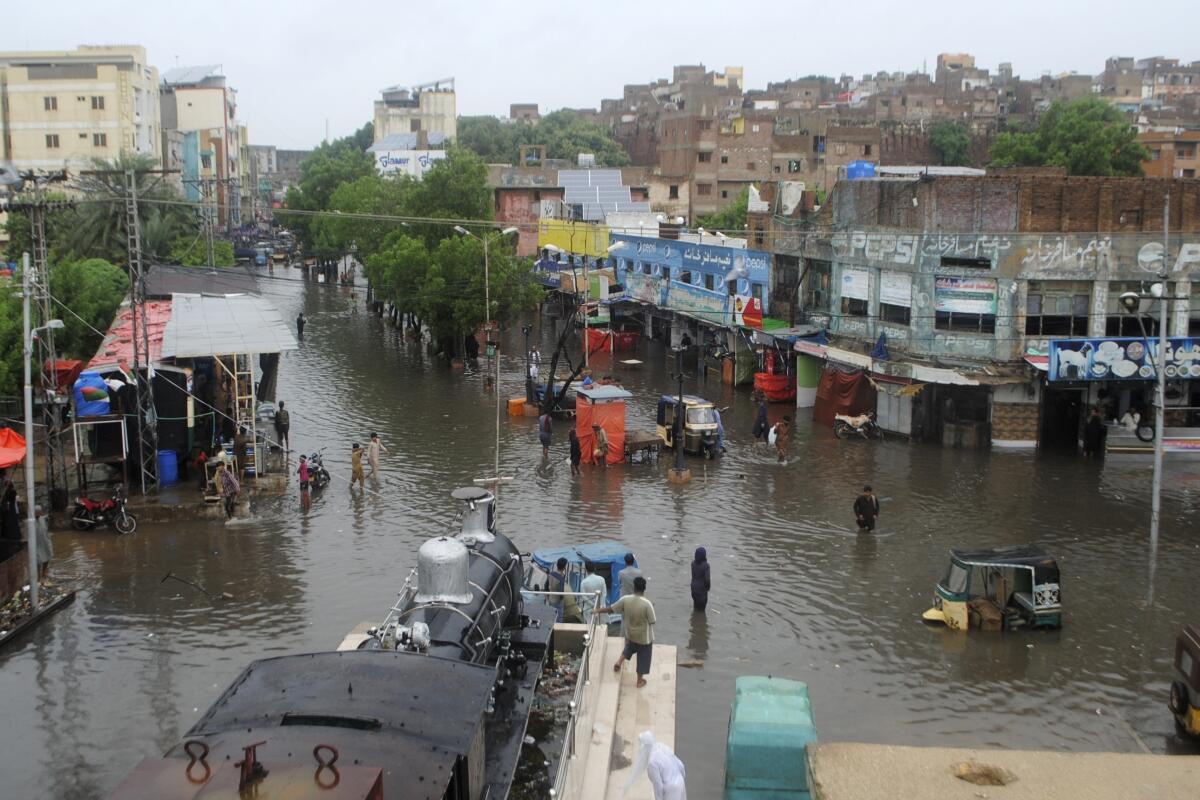Floods wreak havoc across Pakistan, killing 903 since mid-June

- Share via
ISLAMABAD, Pakistan — Heavy rains have triggered flash floods and wreaked havoc across much of Pakistan since mid-June, leaving 903 dead and about 50,000 people homeless, the country’s disaster agency said Wednesday.
Thousands whose homes were swept away now live in tents, miles away from their inundated villages and towns, after being rescued by soldiers, local disaster workers and volunteers.
The National Disaster Management Authority said Wednesday that 126 people were killed in flood-related incidents in the previous 48 hours, with most of the victims being women and children.
The flooding has further exacerbated Pakistan’s economic crisis. Prime Minister Shahbaz Sharif issued an appeal Wednesday from abroad, urging philanthropists to help flood-affected areas in Pakistan.
Sharif is in Qatar, where he arrived on Tuesday seeking financial assistance, loans and foreign investment for his cash-strapped Islamic nation. His government has promised to compensate those who lost homes in the floods.
After talks on Wednesday with Qatar’s emir, Sheikh Tamim bin Hamad al Thani, Sharif announced that the Qatar Investment Authority is prepared to invest $3 billion in Pakistan. The trip is Sharif’s first official visit to Qatar as prime minister since he replaced Imran Khan, who was ousted in a no-confidence vote in parliament in April.
After inundating much of southwestern Baluchistan and eastern Punjab province, flash floods have now started to affect the southern province of Sindh. Authorities this week closed schools in Sindh and Baluchistan.
Sherry Rehman, Pakistan’s minister of climate change, tweeted on Tuesday that local authorities are unable to cope on their own and appealed to the world community to help.
Pakistani Television on Wednesday showed people wading through waist-high water, holding their children and carrying essential items on their heads. Rescuers used trucks and boats to evacuate people to safer places, and food, tents and other basic supplies were being sent to flood-affected areas.
In some places, the popular Geo TV reported, families struggled to bury their loved ones as graveyards were also inundated by floodwaters. The TV broadcast showed mourners carrying coffins through flooded areas to bury the dead away from submerged homes.
Monsoon rains, which started in mid-June, were expected to continue this week, mainly in the south.
Murad Ali Shah, the top elected official in Sindh province, said the situation was worse than in 2010, when floods killed at least 1,700 people in Pakistan, mostly in Sindh. “We are doing our best to evacuate people from flood-hit areas,” he said Tuesday.
Floods have damaged as many as 129 bridges across Pakistan, disrupting the supply of fruit and vegetables to markets and causing a hike in prices.
Experts say climate change has caused erratic weather conditions in Pakistan, resulting in cloudbursts and melting of glaciers that have swelled rivers. They say that cutting planet-warming greenhouse gas emissions will help limit more drastic weather events around the world, including in this South Asian country.
“In recent decades, we never witnessed such an unusual heavier downpour in Pakistan,” said scientist Shahla Gondal, adding that authorities are ill-equipped and “do not know how to tackle” flooding disasters.
More to Read
Sign up for Essential California
The most important California stories and recommendations in your inbox every morning.
You may occasionally receive promotional content from the Los Angeles Times.













